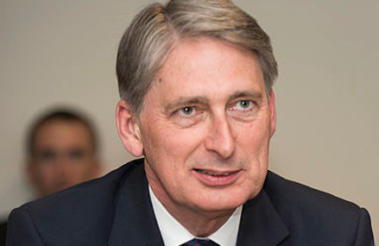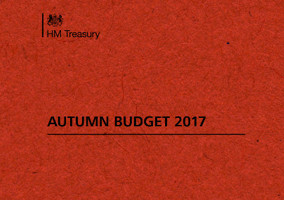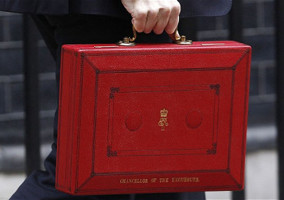This week the chancellor, Philip Hammond, delivered his first spring statement, which was a much more low-key affair than the half-year fiscal events under previous chancellors.
One of Hammond’s first acts as chancellor was to move the budget from spring to autumn and this is the first time the spring statement has provided an update on the economy and the government’s plans.
Prior to his address, Hammond had said the statement is not intended to be a “fiscal event” in the same way that the autumn statement had been and did not make any major spending announcements.
However he did announce the areas where the government intended to consult, including corporate tax and the digital economy, alternative methods for VAT collection, the role of online platforms in ensuring tax compliance by users, VAT registration thresholds, digital payments, single-use plastics and business rates.
In his speech to Parliament, Hammond said that the UK economy had seen the first sustained fall in debt in 17 years and had reached "a turning point in the nation's recovery from the financial crisis of a decade ago".
"There is a light at the end of the tunnel," he said.
In a written statement to Parliament, the economic secretary to the Treasury, Elizabeth Truss, announced how the £3bn put aside to prepare for Brexit would be shared by government departments.
The Department for Digital, Culture, Media and Sport, which includes the Office for Civil Society, has been awarded £26.2m.
Some charities expressed disappointment that the sector, or their causes, had been ignored, while umbrella bodies urged caution in light of the chancellor’s optimism and called on the government to consider how to include charities through its consultation process.
Here is what charities have said.
NCVO: ‘Eyes are already firmly on the autumn budget’
In a blog on NCVO’s website, Paul Winyard, senior policy officer – funding and finance, urged charities to be cautious.
He said even though Hammond had presented a “sunnier forecast for the UK economy” it doesn’t mean that he will soon “turn on the spending taps”.
Winyard added that the continued freeze on most working age benefits “will likely place significant pressure on the household budgets of many beneficiaries”.
He concluded that: “Hammond stated today that, if in the autumn, the public finances continue to reflect the improvements today’s OBR report suggests, he will be able to increase public spending. Eyes are already firmly on the autumn budget in November.”
Acevo: ‘The economy needs to work for charities too’
Vicky Browning, chief executive of Acevo, said: “As promised, there were no big policy or tax changes announced in the spring statement. While there was no sign of significant reform of the apprenticeship levy, a policy that simply does not work in practice for many charities, we hope that the £80m of funding that is to be made available to help small businesses engage with the levy will be open to charities.
“The chancellor repeatedly said that the government is seeking to create "an economy that works for everyone". If the economy is to work for everyone, then it needs to work for charities. Ahead of the autumn budget, and in its response to the Civil Society Strategy, Acevo will be thinking about the changes that it can call for that will enable charity leaders to make a bigger difference.”
CAF: ‘Could have profound effects on charities’
Sir John Low, chief executive of the Charities Aid Foundation, said: “The chancellor’s statement was never expected to announce a raft of new policies, but it does contain details which could have profound effects on charities.
“Cash is still by far the most common way people donate to charity, so the forecast in HM Treasury’s consultation document on cash and digital payments, suggesting that cash transactions will more than halve from 12bn transactions a year to 5.8bn between 2016/2026, could have a real impact on charities if people carry less cash to give away. A consultation on cash is a good opportunity for government and charities to work together to embrace new technologies and ensure the decline of cash doesn’t get in the way of people’s desire to be generous.
“We are pleased that the chancellor is looking at ways to build on the plastic bag levy, which has helped reduce the number of single-use plastic bags and given millions of pounds to charity. We know 70 per cent of people are willing to pay a plastic bag charge, if it goes to a good cause and would urge the government to bear in mind the great work being carried out by charities and social enterprises in being part of the solution to reduce waste and increase recycling capacity.”
Hft: ‘Disappointed social care was neglected’
Billy Davis, public affairs and policy manager, said: "We are very disappointed that the chancellor has neglected social care in his spring statement.
"The sector is in a state of crisis. Our latest Sector Pulse Check report highlighted that 34 per cent of providers are now running at a deficit, more than treble the 11 per cent running at a loss in 2016/17.
“With 54 per cent of providers already curbing investment and a further 50 per cent stating they will need to do so in the near future, the sector is starting to stagnate. Indeed, 89 per cent of respondents believe the current funding model isn't fit for purpose.
"Yet, in spite of this, the chancellor once again remained silent on social care. The government needs to provide clarity on the future funding of the sector now, before the support of some of the most vulnerable adults in society is put at risk."
MS Society: ‘People with MS aren’t a priority’
Genevieve Edwards, director of external affairs at the MS Society, said: “The chancellor’s statement sends a signal that people with MS aren’t a priority. Despite countless warnings about our crumbling social care system, the government has yet again lacked the courage to confront this crisis. Plans to reform the system in the future will come too little, too late for the one in three people with MS currently going without the vital support they need. Proper funding for social care has to come urgently to prevent the system from total collapse.”
Action for Children: 'Silent on giving children the best start'
A spokesman said: “Disadvantaged children needed a ‘do good’ rather than a ‘feel good’ statement today. It’s disappointing that while the chancellor hinted at extra spending in other areas, he was almost silent on giving children the best start in life.
“The failure to adequately fund children’s services means children are going unsupported, often triggering a costly crisis intervention later on. Ducking this means we’re letting down our children and racking up costs in the long term.
“Today the OBR* published analysis showing just how much the financial pressure on local authorities has ratcheted up in recent years; having seen cuts eat into their reserves, meeting rising demand for core services is becoming almost impossible for many local authorities."
United Response: 'Silence on social care was deafening'
Tim Cooper, Chief Executive at United Response, said: “The chancellor has today spoken of his commitment to investing in our nation’s future and building an economy which works for everyone.
“This commitment simply must, however, extend to some of the most vulnerable people in our society. Amid an existing funding crisis for the sector, the chancellor’s silence on social care was once again deafening.
“His failure to outline how he will fund the impending £400m bill for six years’ worth of overnight social care ‘sleep-in’ shifts was especially worrying."
NPC: 'It would be unwise to bank on light at the end of the tunnel'
Dan Corry, chief executive of NPC, said: "The chancellor tried to sound upbeat but in fact the new forecasts from the OBR show that we continue to be in for a prolonged period of slow growth. He teased us with the idea that austerity might soon be over but charities would be unwise to bank on that ’light at the end of the tunnel’. The uncertainty and tough times continue - and that’s on top of the uncertainty surrounding Brexit.
CFG: 'Does not take us much further forward'
Andrew O'Brien, director of policy and engagement at the Charity Finance Group, said: "Overall this spring statement does not take us much further forward. Brexit is creating uncertainty and the government doesn’t know whether it can ease up on austerity or whether it needs to hold money back for further reductions in growth over the years ahead. Consultations on cash and VAT thresholds could have impacts on charities, but it is hard to predict whether these will be positive or negative.
"Worringly, at a local level the Office for Budget Responsibility has found an increasing weakness in local councils’ finances and this could create challenges for charities will rely on local government grants or contracts.
"Looking ahead of the autumn budget, we need to focus on ensuring that the outcomes of the Civil Society Strategy are properly resourced, that our regulator has the funding that it needs, getting certainty on Brexit funding and a plan from government about how the tax system can be used to support charities. None of these issues has been addressed in the spring statement.”
DSC: 'Missed opportunity'
DSC’s director of policy and research Jay Kennedy said: "It’s potentially just a year until the UK is out of the EU but government has missed yet another opportunity to clarify the future of EU funding. Charities are being left in limbo, not knowing the future of current funding and needing to find alternatives which are thin on the ground. The threat of disruption to vital services for people grows day by day."
|
Related articles












